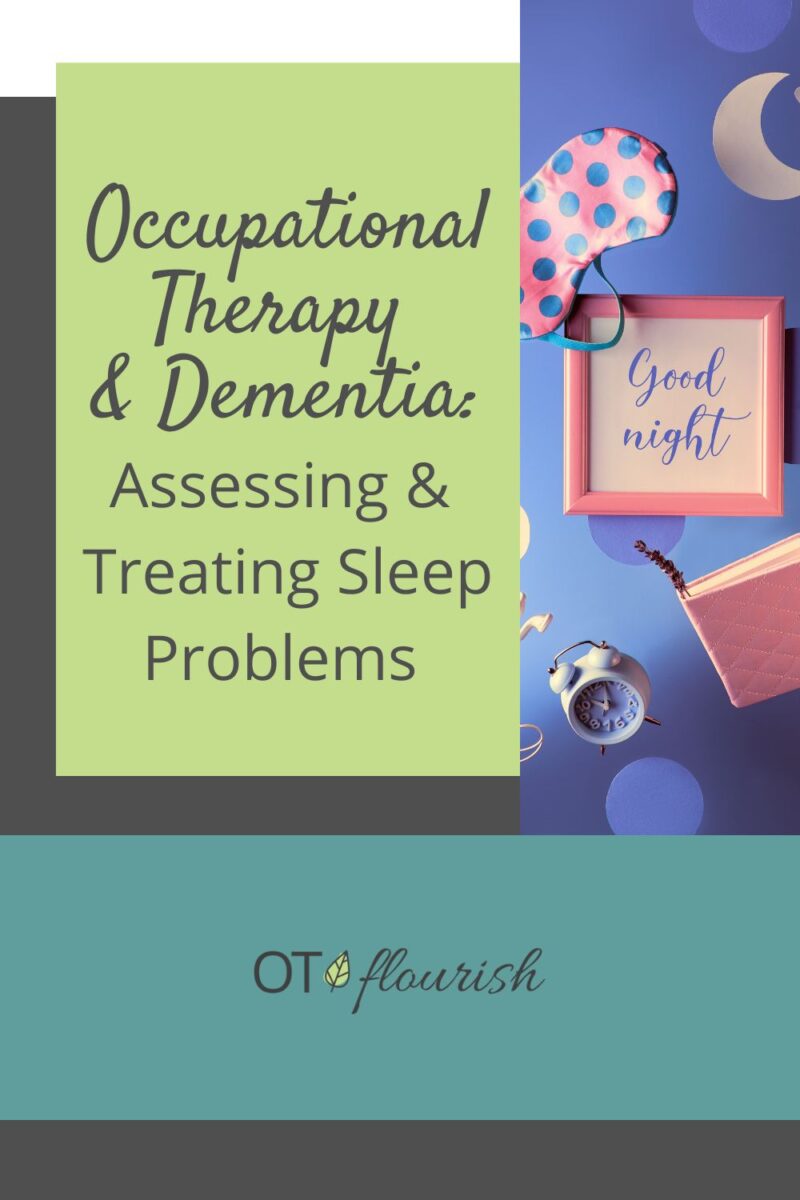Why is sleep so difficult for our patients that have dementia? Through addressing occupational therapy dementia sleep problems, we can assess and develop a treatment plan by asking ourselves “WHY” they are having difficulty and look at the patient holistically.
Occupational therapy dementia care and sleep problems among our patients is a common challenge. These issues can significantly impact the quality of life for both patients and caregivers. In this blog post, we will delve into the complex relationship between dementia and sleep problems, discuss effective assessment strategies, and explore interventions to help our patients sleep better and live life to the fullest.
What do Occupational Therapists Do for Dementia?
Dementia is a challenging condition that affects millions of individuals worldwide, and one of the most prevalent issues they face is sleep disturbances. As occupational therapy dementia practitioners, it is crucial to not only acknowledge the significance of sleep but also understand the underlying complexities and actively work towards improving the sleep quality and brain health in our patients with dementia.
The Importance of Quality Sleep:
Sleep problems among individuals with dementia are not to be taken lightly. Poor sleep can have profound consequences, not only on the patient but also on their caregivers and loved ones. Let’s delve deeper into why quality sleep is paramount for these individuals:
- Exacerbation of Cognitive Decline: Sleep disturbances can worsen cognitive decline in dementia patients, making it even more challenging for them to navigate their daily lives.
- Impact on Behavioral Patterns: Poor sleep can lead to increased agitation, aggression, and other behavioral issues in individuals with dementia, making their care and management more difficult for caregivers.
- Increased Caregiver Stress: Caregivers of dementia patients often bear the brunt of sleep-related issues, as they too experience disrupted sleep. This added stress from the loved one’s sleep disturbance can lead to caregiver burnout and negatively impact their own well-being.
- Decreased Quality of Life: Sleep problems can significantly reduce the overall quality of life for dementia patients, making it essential to address these issues effectively.
- Higher Risk of Mental Health Issues and Mortality: Poor sleep is associated with higher levels of depression and anxiety in dementia patients. Additionally, it can contribute to an increased risk of mortality, highlighting the critical role of sleep in overall health.
Navigating the Complexities:
Understanding the intricacies of sleep problems in dementia is fundamental for occupational therapy practitioners. It’s a multi-faceted issue influenced by various factors, including both natural aging processes and the unique challenges posed by dementia:
Aging and Sleep Patterns:
Aging naturally brings changes in sleep patterns. As we grow older, we tend to sleep lighter and spend less time in REM (rapid eye movement) sleep, which is crucial for restorative rest. These age-related changes can make it easier for individuals to wake up during the night.
Dementia’s Impact on Sleep:
Dementia can exacerbate these age-related changes and introduce its own complications:
- Circadian Rhythm Disruption: Dementia can disrupt the body’s internal clock, causing individuals to lose track of day and night, leading to erratic sleep-wake patterns.
- REM Sleep Disorders: Some individuals with dementia may develop REM sleep disorders, characterized by physically acting out dreams during sleep, potentially causing injury or further sleep disruption.
Identifying Contributors to Sleep Problems:
To effectively address sleep problems in dementia, occupational therapists must first identify the contributing factors.
Some of these factors include:
Medications:
Certain medications, such as diuretics or those with side effects that affect sleep, can be a contributing factor. It’s crucial to review and assess the medications being taken by the patient.
- Can they be taken at different times of the day?
- Can the physician determine if another medication will still be effective with less side effects?
Chronic Medical Conditions:
Conditions like Chronic Obstructive Pulmonary Disease (COPD) or Gastroesophageal Reflux Disease (GERD) can disrupt sleep due to discomfort or the use of medical devices like Continuous Positive Airway Pressure (CPAP) machines. Managing these conditions in tandem with sleep issues is crucial.
Pain:
Chronic pain conditions like arthritis can make it difficult for individuals to find a comfortable sleeping position. Pain management, assessing seating and positioning and alternative wheelchair options like a Broda and suitable sleep accommodations must be considered. Sometimes a patient cannot verbally tell you what is having them experience pain, so it is our job to dig into the why different pain reduction strategies and work on trialling to alleviate it.
Anxiety:
Patients with dementia may experience increased anxiety, particularly during nighttime hours. Addressing and managing this anxiety is essential to mitigate its impact on sleep patterns.
Alcohol and Caffeine:
The consumption of alcohol and caffeine before bedtime can worsen insomnia. Educating patients and caregivers about the effects of these substances on sleep is an important step.

Comprehensive Occupational Therapy Dementia Assessments for Sleep Disturbance:
Once contributing factors have been identified, occupational therapy dementia practitioners can implement strategies to improve sleep quality. This process begins with a comprehensive assessment:
Assessment Strategies:
- Questionnaire: Engage patients and caregivers in detailed discussions about sleep patterns, including bedtime routines, wake-up times, and any difficulties falling asleep or staying asleep.
- Behavior Checklist: Use a comprehensive behavior checklist to understand daily routines and potential triggers that may affect sleep. Identifying patterns and causes of sleep disruptions is crucial. There is a complete sleep assessment and a dementia behavior log in the OT Accelerator to help you determine exactly what you need to do.
- Environmental Assessment: Examine the patient’s sleep environment for factors like noise, light levels, and room temperature that may contribute to sleep disturbances.
- Medication Review: Evaluate the timing and potential side effects of medications to determine if they are negatively impacting sleep quality. Collaboration with healthcare providers may be necessary for medication adjustments.
Occupational Therapy and Dementia Interventions for Sleep:
With a thorough understanding of the patient’s unique situation, occupational therapy practitioners can develop tailored intervention plans. Many times with patients that have dementia, it can be trial, error and modifying interventions.
It’s ok!
Many times occupational therapy dementia care practitioners are worried that their treatment interventions for patients with dementia will be denied by insurance due to the fact that strategies do not work. Insurance companies (including Medicare!) understand that this does take time and is not cookie cutter. If you are documenting correctly and stating why you do not think the intervention worked, what you want to try next time and why. You are good to go!
This blog post on documentation and SOAP notes is goes through each part of the note and where you should be including this information.
Some occupational therapy activities for dementia patients that research supports to assist with their sleep difficulties include:
- Light Therapy: Ensure that patients are exposed to natural outdoor light during the day to help regulate their circadian rhythms. Light therapy devices can also be beneficial when natural light is limited.
- Consistent Routines: Establish consistent evening and morning routines to signal to the body when it’s time to sleep and wake up. Predictability can be comforting for individuals with dementia.
- Environmental Modifications: Make necessary changes in the sleep environment, such as reducing noise and light, correct temperature, comfortable and familiar bedding, pillows, etc to create a conducive atmosphere for sleep.
- Sensory Activities: Engage patients in sensory activities during the day to prevent overstimulation or boredom that can lead to sleep disturbances.
- Medication Timing: If medication is identified as a contributing factor, collaborate with healthcare providers to adjust the timing or type of medication to minimize its impact on sleep.
Setting Realistic Goals:
It’s important to acknowledge that not every occupational therapy dementia intervention will yield the same results for every patient. Occupational therapy practitioners should work closely with their patients and caregivers to establish realistic and individualized goals. These goals should be specific, measurable, and relevant to the patient’s unique needs and circumstances.
For example:
- Reducing Nighttime Awakenings: “Patient will reduce waking up at night from seven nights a week to two nights a week to decrease agitation during the day and participate in morning grooming routine.”
Using a goal writing strategy, such as the COAST method, which stands for:
- Client
- Occupation
- Assist Level
- Specific Condition
- Timeline
This is a well-established framework used in various fields, including occupational therapy, to set effective and meaningful goals.
Completing a good occupational therapy dementia evaluation and writing clear occupational therapy dementia goals truly helps with treatment planning because if you know where the patient starts from, what their baseline cognitive level is and you understand and write collaborative client-centered goals, it will direct you in your plan of care.
Learn step-by-step goal writing in the ebook Occupational Therapy Goal Writing and Goal Bank Guide here ⬇️⬇️⬇️ or check out OT Goal Writing: The #1 Guide.
Enriching Lives Through Better Sleep In Our Patients with Dementia
Addressing sleep problems in patients with dementia is a complex but essential aspect of occupational therapy dementia care. By comprehending the root causes, conducting thorough assessments, and tailoring interventions to each individual, occupational therapists can make a profound difference in the lives of their patients and their caregivers.
The ultimate goal is to enable individuals with dementia to live life to the fullest, ensuring they receive the restorative sleep they need to thrive, improve quality of life and decrease caregiver burden despite the challenges this condition presents. Through their expertise and dedication, occupational therapy dementia practitioners play a pivotal role in enhancing the well-being of those affected.
Further Resources to Dig Into:
- Evidence-Based Recommendations for the Assessment and Management of Sleep Disorders in Older Persons.
- Age-Related Changes in Slow Wave Sleep and REM Sleep and Relationship With Growth Hormone and Cortisol Levels in Healthy Men
- Increasing Walking and Bright Light Exposure to Improve Sleep in Community-Dwelling Persons with Alzheimer’s Disease: Results of a Randomized, Controlled Trial
- 8 Tips for Sleep Hygiene Blog
- Medbridge has a certification on Dementia and the Capacity of Learning for further, in-depth learning!
And forget to subscribe to the OT Flourish Podcast on iTunes, Spotify or any podcast app to get automatic updates and be sure to not miss an episode. Plus, it’s free!








4 thoughts on “Addressing Occupational Therapy Dementia Sleep Problems”
This was a very informative article and useful for those who with with the elderly with a passion to improve their quality of life
thanks Karen!
This was a great and useful article! Thank you for addressing occupational therapys role in this area. I’m so excited I came across this as my capstone is focused on addressing sleep problems for people living with dementia.
So happy it was useful. This is such an under talked about area and I am so happy that you are doing this for your capstone! I’d love to see what you end up with when you are done and if interested in sharing 🙂